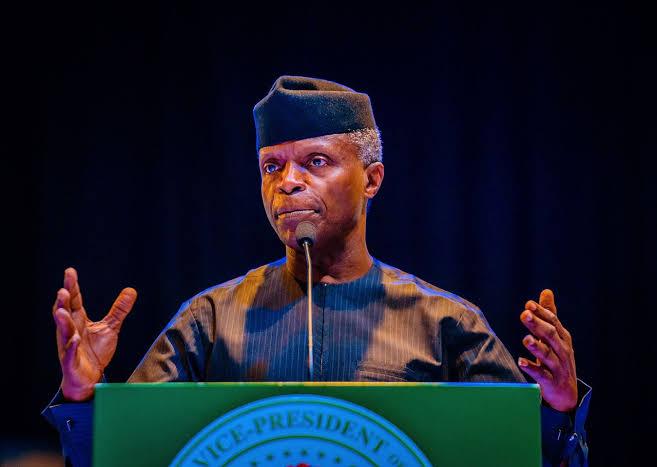The Vice-President, Professor Yemi Osinbajo, SAN, has revealed that Nigerian University System has lost a cumulative 50 months to strike actions by the Academic Staff Union of Universities (ASUU) from 1999 till date.
He has accordingly called for a review of the Nigerian University Autonomy Laws so as to address the challenges of incessant strike action by the various staff unions in the nation’s University system.
Osinbajo spoke on Monday in Abuja, where he formally launched the newly-developed Core curriculum and Minimum Academic Standards for the Nigerian University System (CCMAS) as part of efforts to revitalise university education in Nigeria.
The reviewed curriculum was unveiled at an event marking the 60th-anniversary celebration of the establishment of the National Universities Commission (NUC).
The Vice-President who was represented by the Secretary to the Government of the Federation, Mr Boss Mustapha, lamented that one of the major issues bedevilling university education is the incessant strike actions by various staff unions in the public universities in Nigeria.

According to the Federal Government, the Nigerian University Autonomy laws should be reviewed to grant more powers to the Governing Councils to be able to negotiate on issues bothering on welfare of workers with the staff unions.
Read Also: FG announces new date for resumption of Abuja-Kaduna train services
He noted that all the issues over the years have remained the same, primarily on funding, University Autonomy, and infrastructure among others, stressing that there must be honest conversation on how to end the menace in the nation’s university system.
Osinbajo insisted that government alone could not adequately fund education in Nigeria, saying it was therefore imperative to develop a sustainable funding mechanism taking into consideration the socio-economic issues in the country.
“I need to stress here that government alone cannot fund education. It is therefore imperative that a sustainable model of funding university education must be developed. Such a model should take cognisance of the socioeconomic diversity and competing expectations of the Nigerian populace and workforce,” he said.
He added: “You are all aware that one of the issues bedevilling university education in Nigeria, is the incessant strike actions by various unions in our public institutions. For instance, the system had cumulatively lost over 50 months from 1999 till date as a result of strike actions by the Academic Staff Union of Universities.”
“I doubt if there is any country that has lost such amount of time to strikes in its university system. From the first strike from 1978, all the issues have remained the same. The agitations have been primarily on funding, university autonomy, and remunerations.”
“The most recent industrial actions by the University-based unions has necessitated the revisit of issues affecting University system in Nigeria and this will lead to review of the Nigerian University Autonomy laws.”
Read Also: FG has no plan to increase fuel pump price – Official
While stressing that access and quality have been key concerns in the delivery of university education in Nigeria, he stated that the Federal Government has been supporting and would continue to support University education in the country.
Osinbajo also declared that the National Universities Commission (NUC) is the sole regulator of the Nigerian University System in Nigeria and asked the Minister of Education, Malam Adamu Adamu to stream the powers of NUC with those of professional bodies trying to compete with the Commission in the area of accreditation.
He said Government was aware of the challenges NUC is faced in that regard hence the need to clarify this for the professional bodies to know their limits when it comes to approval and accreditation of programmes.
Minister of Education, Malam Adamu, who was represented by the Registrar of the Joint Admissions and Matriculation Board (JAMB), Prof. Is-haq Oloyede, commended the NUC Executive Secretary, Prof. Abubakar Adamu Rasheed for championing the course of revitalisation of Nigerian University System.
Executive Secretary of NUC, Prof. Abubakar Adamu Rasheed while reiterating the commitment of the Commission towards ensuring that the graduates of the University System are of quality and globally competitive, noted that the new CCMAS being launched was comparable in content to similar curricula in the best university systems in the world and relevant to Nigeria’s socio-cultural context.
He noted that this would address the knowledge and skills gaps in the curriculum it is replacing, explaining that while providing 70 per cent of the core curriculum as a minimum for all Nigerian universities, it allows institutions to “customise and bespoke the curriculum by adding 30% of courses to reflect their uniqueness of mission and contextual peculiarities”.
According to him, the new curriculum places an accent on entrepreneurship, practical rather than theoretical knowledge and skills and the development of 21st-century skills.
He added that in line with contemporary global practice, there was a change of nomenclature from Benchmark Minimum Academic Standards (BMAS) to Core Curriculum and Minimum Academic Standards (CCMAS).
He said: “In consonance with emerging development globally, the curriculum is to stimulate blended learning in its delivery, strategically configured to produce future-fit graduates and provides essential foundations for lifelong learning.”
“Nurtures deep thinkers and problem solvers and graduates who are highly skilled in their professions and disciplines as well as encourages interdependencies of disciplines.”



Comments are closed.